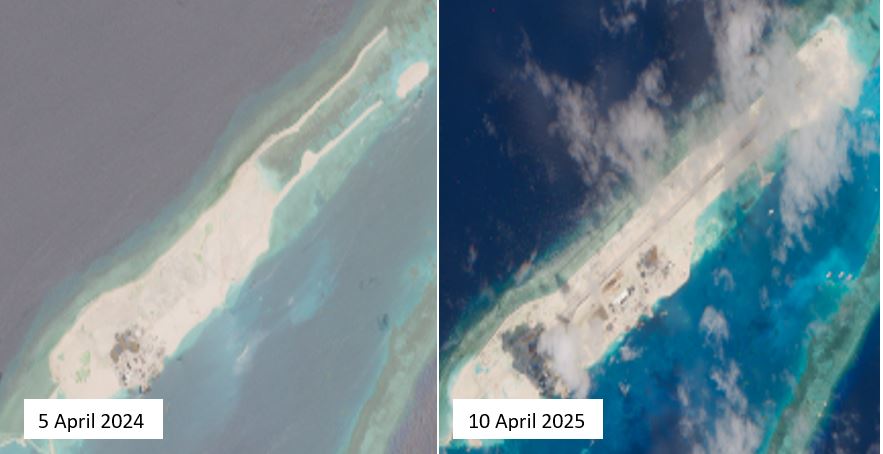Reefs, Realpolitik, and the Art of Steady Diplomacy
Reefs, Realpolitik, and the Art of Steady Diplomacy
Nor Aini Binti Mohd Nordin
14 April 2025
Source: soar.earth (Sentinel 2)
The recent large-scale land reclamation activity at Barque Canada Reef — reportedly amounting to over 641 acres, marks a notable development in the evolving dynamics of the South China Sea. While China’s sweeping claims and militarized artificial islands dominate discourse, Hanoi’s more subdued expansion strategy is increasingly reshaping the maritime chessboard. Situated within the contested Spratly Islands, this expansion adds to a growing pattern of physical transformation in the maritime landscape, with potential implications for regional stability and the management of overlapping claims.
While this particular reef does not fall within areas directly claimed or occupied by Malaysia, the scale of the reclamation signals an intensifying trend across the broader South China Sea. Several claimant states have undertaken land reclamation and infrastructure development over the years, contributing to a complex environment where territorial assertions are increasingly being reinforced through physical presence and strategic infrastructure.
For Malaysia, such developments warrant close and careful observation. They raise important considerations about the pace and trajectory of activities in disputed areas, and the broader implications for peace, security, and the integrity of ongoing regional efforts to manage the South China Sea through dialogue and cooperation.
These actions underscore the urgency of reaffirming key principles agreed upon by regional stakeholders, notably, the importance of self-restraint, non-militarization, and the peaceful resolution of disputes in accordance with international law, including the United Nations Convention on the Law of the Sea (UNCLOS). They also highlight the need to sustain momentum in the ongoing negotiations for a Code of Conduct (CoC) between ASEAN and China, aimed at establishing a framework for stability, transparency, and trust in the region.
As a littoral state and a direct stakeholder in the South China Sea, Malaysia remains committed to a balanced and constructive approach. This includes promoting regional mechanisms that support dialogue, confidence-building, and practical cooperation among all parties. Bilaterally and within ASEAN, Malaysia continues to engage in quiet diplomacy, advocating for initiatives that reduce tensions and encourage long-term cooperation.
The South China Sea remains one of the most strategically significant and sensitive regions in Southeast Asia. Developments such as those at Barque Canada Reef reflect the ongoing complexity of managing overlapping claims, geopolitical competition, and resource interests in a shared maritime domain. Moving forward, Malaysia must stay alert, act prudently, and continue to champion principles that serve both its national interests and the broader goal of regional peace and stability.
Vietnam’s move at Barque Canada Reef may not be the most provocative in the South China Sea saga, but its implications ripple far beyond the reclaimed sands. In a theatre where artificial islands are becoming permanent markers of political will, Malaysia must ensure it is not outpaced by events — or outflanked by silent strategies.
In a region shaped by shifting tides, Malaysia must remain agile, principled, and vigilant. The game being played is realpolitik — and everyone is building their board.
